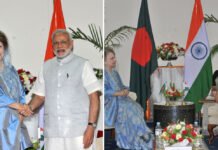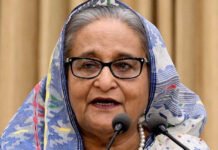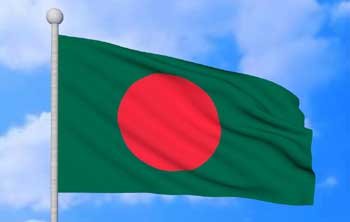INVC NEWS
Dhaka : In Bangladesh, the escalating threats from religious extremists are creating an atmosphere of fear and apprehension among the minority communities. Traditionally, festivals like Durga Puja, a vibrant celebration for Hindus in the region, have been marked by grand processions, music, and religious fervor. However, in recent years, these festivities have increasingly become a target of intimidation, leading to a subdued and anxiety-laden environment for the minorities. The rising radicalism has raised significant concerns about religious intolerance, pushing these communities into a corner, threatening their cultural expression, and their very existence.
Durga Puja Under Threat: Curbing Festivities and Cultural Expression
The Durga Puja festival is one of the most important celebrations for the Hindu minority in Bangladesh. Yet, as radical elements within the country grow more emboldened, these festivities have been subjected to repeated threats, boycotts, and violence. In Dhaka, the Ramakrishna Mission, which traditionally hosts Kumari Puja, an integral part of the Durga Puja celebration, has decided not to organize it this year. The decision comes amid rising fears of extremist attacks, with warnings from radical groups that no sound, music, or microphones should be used during the celebration.
These threats go far beyond mere words. Reports suggest that Hindu communities have been coerced into paying large amounts, sometimes as high as five lakh taka, as extortion money to continue their religious observances in peace. This type of harassment underscores the precarious position of the minority communities and the urgent need for greater protections from the Bangladeshi government.
Rising Religious Intolerance: A Growing Concern for Bangladesh’s Diversity
The atmosphere of religious intolerance is nothing new in Bangladesh, but the rate at which it has intensified is alarming. Minorities, including Hindus, Christians, and Buddhists, are increasingly finding themselves the target of hate campaigns, harassment, and violent attacks. One key indicator of this rising tide of religious extremism is the sharp decline in the minority population.
In 1971, when Bangladesh gained independence from Pakistan, minorities made up roughly 21 percent of the population. Today, that number has shrunk to just 8.7 percent, a figure that is telling of the immense pressures faced by these communities. The fear of persecution, constant threats of violence, and lack of government protection have forced many to leave their homeland or live under a constant cloud of insecurity.
The Role of the Government: Promises of Protection or Empty Gestures?
The Bangladeshi government, while making statements about ensuring the safety and well-being of its minority populations, has been criticized for failing to take meaningful action. The assurances of increased security during Durga Puja and other religious events often ring hollow to the people who live in fear day after day.
Minority activists argue that the government’s actions are merely performative, a way to present an image of inclusivity and religious harmony to the global stage. However, on the ground, these communities feel more vulnerable than ever. Reports of vandalism, arson, and physical attacks against minority places of worship and private property are disturbingly common. Despite this, there are few meaningful convictions or legal consequences for those responsible for these crimes, further emboldening radical groups to continue their campaigns of terror.
















